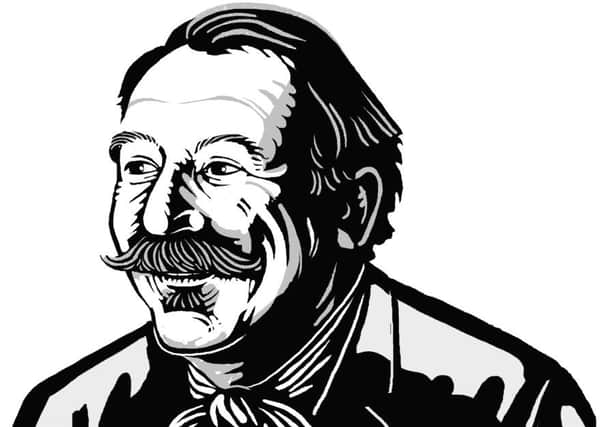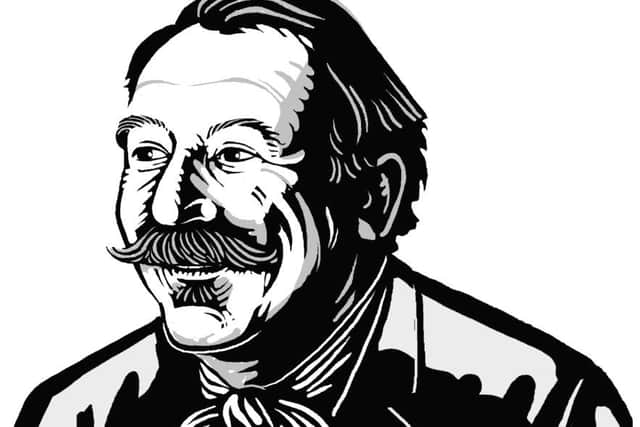44 Scotland Street: Distressed furniture


“We haven’t lived in the place for years,” he said. “And recently we let it out, of course. But all the stuff is ours, and some of it is actually quite good, even if it’s a bit distressed, as the antique dealers say. Mind you, distressed is not quite strong enough for some of my furniture. My furniture has moved beyond being distressed. Terminal might be more accurate. I can just imagine the auction catalogues – can’t you? – “a table in terminal condition” and so on. Hah!”
Matthew was keen to keep as much of the Duke’s furniture as possible, but Elspeth had other ideas. “It’s terrible old rubbish,” she said. “Look at this.” She referred to the inventory that the Duke’s agent had prepared. “A charming William IV library table with only two legs, but otherwise sound.”
Advertisement
Hide Ad“Oh, I saw that one,” said Matthew. “It had a lovely green leather top.”


“That’s as may be,” Elspeth retorted, “but what’s the use of a table with two legs? Or …” And here she pointed to another inventory item. “A glass-fronted bookcase, circa 1860; no glass.”
She looked up at Matthew. “What is the point, may I ask, of having a glass-fronted bookcase with no glass in the front? In fact, one might even go so far as to say that it’s an impossibility. A glass-fronted bookcase with no glass is simply not a glass-fronted bookcase.”
“Perhaps,” said Matthew. “If you’re intent on being pedantic.”
They normally did not argue with one another, but even the most equable of couples may be expected to fall out over a move. And so Matthew decided at a very early stage that he would leave everything up to Elspeth and not dispute any of her decisions. Armed with this authority, Elspeth made all the arrangements, chose the date of departure, and did most of the packing herself. He helped, of course, mostly by taking the triplets for long walks in the Botanical Gardens in their three-seated pushchair. Pushing three young around inevitably brought a response from passers-by – looks that ranged from amusement to sympathy and sometimes on to disapproval.
“Three!” remarked one elderly woman as Matthew and the triplets passed her on the way to the greenhouse. “My, you must have been insatiable!”
Advertisement
Hide AdMatthew was ready to let this remark pass with a polite nod of his head, but then its implications dawned on him. Did she really think that? he asked himself.
“Excuse me,” he said, “but I wonder what you mean by what you’ve just said.”
Advertisement
Hide AdThe woman blushed. “Oh … oh, I don’t really know. It’s just that it must take a lot of energy to create triplets. Not every man … Oh dear, I’m not sure that I know what I meant.”
And then there was the visiting American woman who asked the triplets’ names when they were waiting together for a pedestrian light in Stockbridge. “Dear little things,” she said. “They’re all boys, aren’t they? What are they called?”
“Tobermory, Rognvald and Fergus,” answered the proud father.
“What wonderful Scottish names!” enthused the visitor. “Which is Tobermory?”
Matthew hesitated. A truthful response was that he did not know, as although Elspeth claimed to be able to differentiate between the three boys, he had no idea. But a father could hardly confess to being uncertain as to the identity of his own sons, and so he pointed at random to one of the boys. “Him,” he said.
The woman bent forward to look more closely. “We went to Tobermory last week,” she said. “We were visiting Iona and afterwards we called in at Tobermory – a lovely place …” Her voice trailed away. “He’s wearing his brother’s jumper, I see. It has Fergus knitted across the front.”
Advertisement
Hide AdMatthew waved airily. “They share their clothes,” he said airily. “And of course they’re far too young to dress themselves, or to care what they’re wearing, for that matter.”
In the last few days before the move, the boys were left in the care of Anna, their Danish au pair, while Matthew and Elspeth made final preparations for the move. A couple of weeks before they were due to move in, the Duke agreed to meet them at the house to hand over the keys – they had already paid the purchase price – and to answer any final queries they might have.
Advertisement
Hide Ad“I shall miss the old place,” he said, as he stood with them in the doorway of the large ground-floor drawing room. “We used to have such marvellous parties here back in the old days. White tie affairs, you know. The men in Highland Dress, of course, and the women in long dresses with tartan sashes. Interminable affairs, some thought, but I always enjoyed them. We used to give breakfast to anybody who was still there at six in the morning and standing. Sometimes we even had to give them lunch. Frightful, but there we are – it’s very hard to ask guests to leave, you know. Some stayed for weeks, you know.” He paused. “I never really knew how to do it until I read about what Willie Maugham said to Paddy Leigh Fermor after Paddy had for some reason been terribly rude to the old boy when he was staying under his own roof at the Villa Mauresque. For some reason Paddy imitated Maugham’s stutter at the dinner table – causing terrible offence. One doesn’t imitate the host’s stutter in any circumstances. Anyway, Paddy did and so Maugham said to him over coffee that night, ‘I shall have to say goodbye to you at this stage as when I get up tomorrow morning you will already have left.’”
The Duke laughed.
“How very tactful,” said Matthew.
“I never met Maugham, of course,” continued the Duke. “He was more my father’s generation. In fact, Pa met him once or twice in Antibes. He said he was an ill-tempered old cove, but there we are. Leigh Fermor shouldn’t have done what he did.”
The Duke gazed fondly over the drawing room. “Yes, those white-tie parties were grand evenings, and people paid attention to what they wore. You can’t just add a white tie to Highland Dress, you know. It all depends where you are. If you’re in Perthshire, for example, you can only wear a white tie with Highland Dress if you were born in the county. In Argyll, if the invitation says white tie – and it does for occasions like the Oban gathering – you wear a jabeau, as I’m sure you know.’
Matthew was silent. He knew nothing about any of this and he wondered why nobody had ever taught him about these things that were so important even while being utterly unimportant.
• Alexander McCall Smith welcomes comments from readers. Write to him c/o The Editor, The Scotsman, Level 7, Orchard Brae House, 30 Queensferry Road, Edinburgh, EH4 2HS or via e-mail at [email protected].